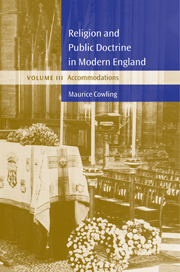Book contents
- Frontmatter
- Contents
- Foreword and acknowledgements
- Introduction
- I The Christian intellect and modern thought in modern England
- 1 The reanimation of Protestantism I
- 2 Christianity and literature I
- 3 The reanimation of Protestantism II
- 4 The enlargement of Christianity
- 5 Christianity and literature II
- 6 Christianity and modern knowledge I
- 7 Whiggism, Liberalism and Christianity I
- 8 Whiggism, Liberalism and Christianity II
- 9 Christianity and modern knowledge II
- 10 Christianity in an unfriendly world I
- 11 Christianity in an unfriendly world II
- 12 Christianity in an unfriendly world III
- 13 Christianity in an unfriendly world IV
- 14 Christianity in an unfriendly world V
- II The post-Christian consensus
- III Conclusion: religion and public doctrine in modern England
- Notes
- Index of proper names
7 - Whiggism, Liberalism and Christianity I
Published online by Cambridge University Press: 23 December 2009
- Frontmatter
- Contents
- Foreword and acknowledgements
- Introduction
- I The Christian intellect and modern thought in modern England
- 1 The reanimation of Protestantism I
- 2 Christianity and literature I
- 3 The reanimation of Protestantism II
- 4 The enlargement of Christianity
- 5 Christianity and literature II
- 6 Christianity and modern knowledge I
- 7 Whiggism, Liberalism and Christianity I
- 8 Whiggism, Liberalism and Christianity II
- 9 Christianity and modern knowledge II
- 10 Christianity in an unfriendly world I
- 11 Christianity in an unfriendly world II
- 12 Christianity in an unfriendly world III
- 13 Christianity in an unfriendly world IV
- 14 Christianity in an unfriendly world V
- II The post-Christian consensus
- III Conclusion: religion and public doctrine in modern England
- Notes
- Index of proper names
Summary
It was in some sense fortunate … for the Church of England that the Reformation in this country was effected by men who cared little about religion. And, in the same manner, it was fortunate for our civil government that the Revolution was in a great measure effected by men who cared little about their political principles.
(T. B. Macaulay, Hallam's Constitutional History, in Edinburgh Review, September 1828, reprinted in Lady Trevelyan, ed., Miscellaneous Works of Lord Macaulay, 1880, Vol. IV, p. 274)It is always … important to trace the direction in which the spirit of self-sacrifice is moving … Celibacy, voluntary poverty and voluntary subjection, were the three … subjects which Giotto painted over the high altar of Assisi as the distinctive characteristics of the saint … All of them have now lost their power … The spirit of self-sacrifice still exists, but it is to be sought in other fields – in a boundless philanthropy growing out of affections that are common to all religions, and above all in the sphere of politics. Liberty and not theology is the enthusiasm of the nineteenth century.
(W. E. H. Lecky, History of the Rise and Influence of the Spirit of Rationalism in Europe, 1865, 1910 edn, pp. 224–5)The Peace Treaty is bad, thoroughly bad, but its badness is due … as much to the failure of the peoples as to the failure of their leaders at the Conference … I have been long from home, far away from the base which I have to rely on. […]
- Type
- Chapter
- Information
- Religion and Public Doctrine in Modern England , pp. 151 - 173Publisher: Cambridge University PressPrint publication year: 2001



